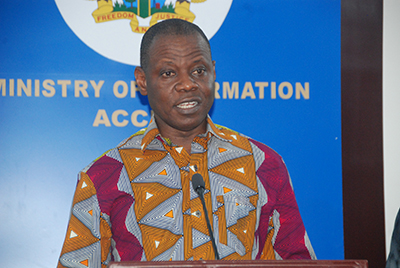The Director General of the Ghana Health Service (GHS), Dr. Patrick Kuma Aboagye, has disclosed that the Service had lost over 500 nurses, but measures had been put in place to recruit more.
“We have also lost experienced and skilled staff, but we are also putting systems so that [within] the next two years, we are able to replace them with further training and recruitment. [In] the last one year we lost about 525 nurses, but we are currently having recruitment of additional nurses across the country,” he stated.
Dr. Patrick Kuma Aboagye made this known at a news conference, organised by the Ministry of Information in Accra yesterday. He further added that his outfit had also been able to send doctors to the rural areas. He, however, encouraged communities to put in place systems that would attract skilled staff to their districts and areas.
In the attainment of the Universal Health Coverage by the year 2030, Dr. Aboagye indicated that it remained a focal agenda. “The Service has revisited the strategy to strengthen primary health care and deepen our collaboration partners towards redesigning of the primary health care system to improve the quality and more patient centered care.”
He continued that the Service, in the last few years, had been able to reduce the maternal mortality rate.
“Our institutional maternal mortality has dropped from 875 deaths in 2018 to about 809 in the 2022. And this for mortality looks like not a very significant relation, but for maternal mortality, that’s quite significant, especially when our deliveries have moved from about 9000 as increase over the years by about 13 % and we still are able to maintain a significant reduction in deaths,” Dr. Patrick Kuma Aboagye added.
Also, he noted that malaria deaths had dropped significantly in the last five years, from one 1.42 per hundred thousand to 0.45 per hundred thousand, which was also the best significant reduction.
“We have improved our supply chain system through making sure it is visible to be able to see in real time where supplies are, where we are short, or where we are over stock. And so this is also an important area we talk about, and it’s gone as far as from the national level to the CHPS compounds, will be able to basically see our supplies.
“We have also been able to improve our E-health system by ensuring that the E tracker, which gives us real data and detailed it, and not just the summary data and also electronic medical records through the Light with Health Information System, has also been introduced across the country,” he said.
To improve the status of health, he emphasised that they have introduced significant programmes in Adolescent Health, not just of adults, but also adolescents, “and also our future leaders.” The last one, he said, was a yellow programme, which seeks to improve the health of adolescents, and also reduce the risk approaches they took as a group.









